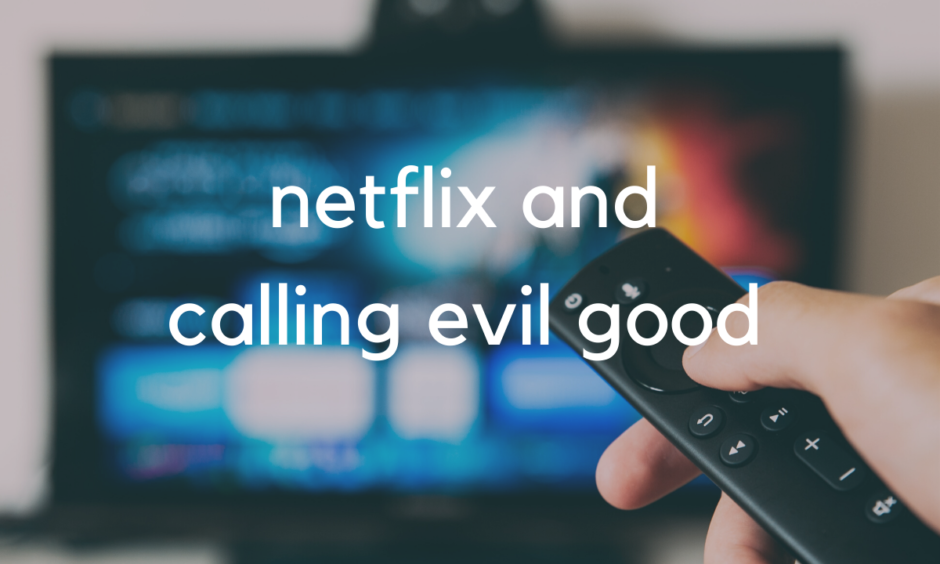Over the last few years I’ve noticed that when people talk about a TV show or movie they’re watching that they enjoy they often say something along the lines of, “Oh, you have to watch it! It’s so good.” or “That’s such a good show!” The statemen generally puts the emphasis on the word good. “That’s such a good show.”
On the occasions when I go check out an episode of the show mentioned, more often than not I discover that the show is not good – At least not in the truest sense of the word. A show that is driven by sexual intrigue, shock-and-awe violence, or reveling in the disturbing actions of an anti-hero isn’t good.
Oh, I get what people are saying. They’re saying that the show is engaging. That they want to watch more of it. That the production quality is high. That the characters are interesting. But simply because a show or movie is interesting, engaging, or makes you want to continue watching doesn’t make it good.
My guess is that, if you’re affected by the COVID-19-related lockdowns and are, like several of my friends, without work for the next couple weeks you’ll be distracting yourself more than normal by watching shows and movies. That’s not a bad thing in and of itself, but we need to make sure that as disciples of Jesus we’re conscious about what we’re watching and how we’re talking about it.
Defining Good
Woe to those who call evil good
Isaiah 5:20
and good evil,
who put darkness for light
and light for darkness,
who put bitter for sweet
and sweet for bitter!
Merriam Webster defines the adjective good as, “1. to be desired or approved of. ‘A good quality of life’ or “2. having the qualities required for a particular role. ‘The schools here are good’.
When we say a show is “good” we generally intend that second definition – it fulfills the qualities required for engaging our minds and emotions, distracts us from the world around us, and makes us wonder what will happen next.
The problem is that if we want to follow Jesus we must allow God’s Word to shape all of our lives, including the language we use. Our words define and shape reality. The language we use impacts how we view the world, and when we begin calling something that is not good good we’re giving voice to a distorted view of reality. The biblical definition of goodness doesn’t include evil.
Let’s make sure ours doesn’t either.
Words Matter
Isaiah has strong words for those who call things that are evil good. Shows or movies that revel in and glorify (even if that reveling and glorifying is done only by the length of time they focus on) sexuality outside of God’s limits within marriage, murder and gossip, manipulation, intrigue, etc are uplifting what God’s word clearly declares as evil. They are doing exactly what Isaiah says brings woe; replacing light with darkness, calling what is bitter sweet and what is sweet bitter.
When you call a show good you are recommending it to the people you’re speaking to, encouraging them to ingest its contents. Just as God spoke and created reality, so our words have an ability to shape reality. Your words are shaping how they view the content of that movie or show.
We need to be careful that we are not doing what Paul says that those trapped in sin and darkness do in Romans 1:32 and giving approval to the practice (real or cinematic) of evil deeds.
Watch your words
Think about what you’re saying when you say a show is “good.” Evaluate the both the content and intent of the show in light of what God has said is good. Be more intentional about how you speak.
A couple examples of small but meaningful ways to shift your language:
- Say “This show is really hard to stop watching” rather than “this show is good.”
- Say “This show really makes you think.” rather than “This show is good.”
- Say “That movie was intense.” rather than “That movie was great!”
- Say “The movie was really uplifting” “rather than “The movie was good.”
If what you’re watching doesn’t actually align with God’s definition of good let’s not call it good. Let’s watch our words and be intentional with our language. If Jesus can admonish someone for calling him “good teacher” because only God is good (Luke 18:19), we too must take to heart how we use our words because our words reveal our heart.
Watch your watching
Our words are only the first thing that we need to evaluate. If there are things you’re watching on a regular basis that you can’t accurately, biblically say are good there’s a high likelihood that it’s probably not something worth watching.
We’re not commanded to be pietists or isolate ourselves from the content of the world, but we are called to be “wise as serpents and innocent as doves,” and to prioritize exposing ourselves to that which is true, noble, right, pure, lovely, and admirable (Phil. 4:8).
Is what you’re watching good? If not, should you really be watching it? Probably not. But that’s a larger discussion for a different post.
Here’s my main point: Don’t be an unconscious consumer. Don’t encourage others to be the same by blithely calling evil good.
Be intentional about your language when it comes to movies and shows. Be equally intentional about consuming things that move you towards the goodness that God has displayed in Jesus.





No Comments